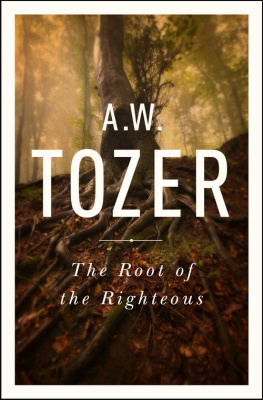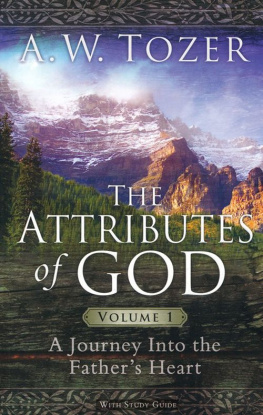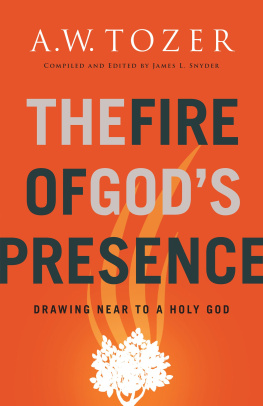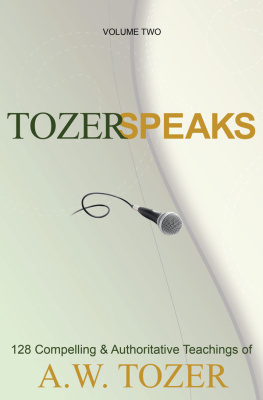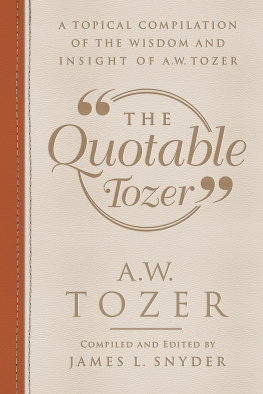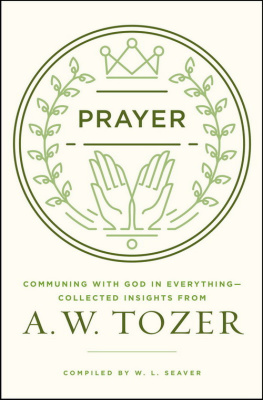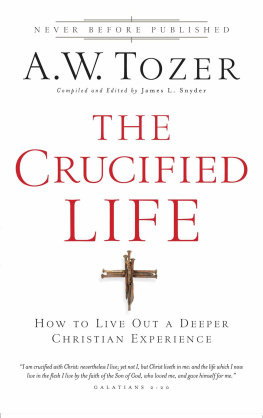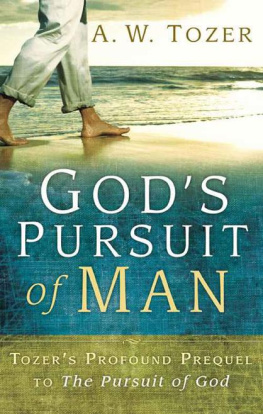Table of Contents
Pagebreaks of the print version
Guide
1955, 1986 by
LOWELL TOZER
All rights reserved. No part of this book may be reproduced in any form without permission in writing from the publisher, except in the case of brief quotations embodied in critical articles or reviews.
All Scripture quotations, unless otherwise indicated, are taken from the King James Version.
Previously published by Christian Publications, Inc.
First Christian Publications edition 1955
First WingSpread Publishers edition 2006
First Moody Publishers edition 2015
Interior design: Erik M. Peterson
Cover design: Faceout Studio
Cover photo of tree with roots copyright by andreiuc88/
Shutterstock/83707738. All rights reserved.
ISBN: 978-1-60066-797-8
LOC Catalog Card Number: 2006933095
We hope you enjoy this book from Moody Publishers. Our goal is to provide high-quality, thought-provoking books and products that connect truth to your real needs and challenges. For more information on other books and products written and produced from a biblical perspective, go to www.moodypublishers.com or write to:
Moody Publishers
820 N. LaSalle Boulevard
Chicago, IL 60610
1 3 5 7 9 10 8 6 4 2
Printed in the United States of America
CONTENTS
Friend,
Thank you for choosing to read this Moody Publishers title. It is our hope and prayer that this book will help you to know Jesus Christ more personally and love Him more deeply.
The proceeds from your purchase help pay the tuition of students attending Moody Bible Institute. These students come from around the globe and graduate better equipped to impact our world for Christ.
Other Moody Ministries that may be of interest to you include Moody Radio and Moody Distance Learning. To learn more visit http://www.moodyradio.org/ and http://www.moody.edu/distance-learning/
To enhance your reading experience weve made it easy to share inspiring passages and thought-provoking quotes with your friends via Goodreads, Facebook, Twitter, and other book-sharing sites. To do so, simply highlight and forward. And dont forget to put this book on your Reading Shelf on your book community site.
Thanks again, and may God bless you.
The Moody Publishers Team

T hese chapters came into being over a period of about five years and were written in many places and under a variety of interesting circumstances. They are in no sense quiet religious essays, but were born in the midst of life; and while they have, as I hope, heaven in full view, they are never too far removed from the rough world where the children of God struggle and work and pray.
The favorable reception given these chapters when they first appeared as editorials in The Alliance Weekly led to their publication in this more permanent form.
A.W. TOZER

O ne marked difference between the faith of our fathers as conceived by the fathers and the same faith as understood and lived by their children is that the fathers were concerned with the root of the matter, while their present-day descendants seem concerned only with the fruit.
This appears in our attitude toward certain great Christian souls whose names are honored among the churches, as, for instance, Augustine and Bernard in earlier times, or Luther and Wesley in times more recent. Today we write the biographies of such as these and celebrate their fruit, but the tendency is to ignore the root out of which the fruit sprang. The root of the righteous yieldeth fruit, said the wise man in the Proverbs (12:12). Our fathers looked well to the root of the tree and were willing to wait with patience for the fruit to appear. We demand the fruit immediately even though the root may be weak and knobby or missing altogether. Impatient Christians today explain away the simple beliefs of the saints of other days and smile off their serious-minded approach to God and sacred things. They were victims of their own limited religious outlook, but great and sturdy souls withal who managed to achieve a satisfying spiritual experience and do a lot of good in the world in spite of their handicaps. So well imitate their fruit without accepting their theology or inconveniencing ourselves too greatly by adopting their all-or-nothing attitude toward religion.
So we say (or more likely think without saying), and every voice of wisdom, every datum of religious experience, every law of nature tells us how wrong we are. The bough that breaks off from the tree in a storm may bloom briefly and give to the unthinking passerby the impression that it is a healthy and fruitful branch, but its tender blossoms will soon perish and the bough itself wither and die. There is no lasting life apart from the root.
Much that passes for Christianity today is the brief, bright effort of the severed branch to bring forth its fruit in its season. But the deep laws of life are against it. Preoccupation with appearances and a corresponding neglect of the out-of-sight root of true spiritual life are prophetic signs which go unheeded. Immediate results are all that matter, quick proofs of present success without a thought of next week or next year. Religious pragmatism is running wild among the orthodox. Truth is whatever works. If it gets results it is good. There is but one test for the religious leader: success. Everything is forgiven him except failure.
A tree can weather almost any storm if its root is sound, but when the fig tree which our Lord cursed dried up from the roots it immediately withered away (Mark 11:2021). A church that is soundly rooted cannot be destroyed, but nothing can save a church whose root is dried up. No stimulation, no advertising campaigns, no gifts of money and no beautiful edifice can bring back life to the rootless tree.
With a happy disregard for consistency of metaphor the apostle Paul exhorts us to look to our sources. Rooted and grounded in love (Ephesians 3:17), he says in what is obviously a confusion of figure; and again he urges his readers to be rooted and built up in him (Colossians 2:7), which envisages the Christian both as a tree to be well rooted and as a temple to rise on a solid foundation.
The whole Bible and all the great saints of the past join to tell us the same thing. Take nothing for granted, they say to us. Go back to the grass roots. Open your hearts and search the Scriptures. Bear your cross, follow your Lord and pay no heed to the passing religious vogue. The masses are always wrong. In every generation the number of the righteous is small. Be sure you are among them.
A man shall not be established by wickedness: but the root of the righteous shall not be moved (Proverbs 12:3).

P robably the most widespread and persistent problem to be found among Christians is the problem of retarded spiritual progress. Why, after years of Christian profession, do so many persons find themselves no further along than when they first believed?

